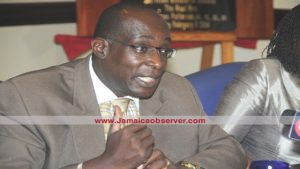 Ruel Reid’s Facebook threat to impose sanctions and seize control of school boards that fail to adhere to the Government’s new auxiliary fee policy yesterday thrust the education minister into a fresh round of controversy with administrators, one of whom advised him to tone down the rhetoric.
Ruel Reid’s Facebook threat to impose sanctions and seize control of school boards that fail to adhere to the Government’s new auxiliary fee policy yesterday thrust the education minister into a fresh round of controversy with administrators, one of whom advised him to tone down the rhetoric.
Reverend David Gosse, board chairman of Ardenne High School, said he is concerned with the fact that Reid is sending out signals that are “not very wise”.
“What I would advise the minister to do is to cut down on the rhetoric. It is not suiting him, and it is creating more distrust among people who volunteer their time,” Gosse told the Jamaica Observer. “We’re not paid for what we do. We do it voluntarily, and the schools are struggling.
he feels something is not right, and we are in breach, call us up and ask to see the books and we can explain.” On Sunday, Reid, a social media devotee, used hisFacebook page to warn school boards that if they fail to adhere to the new government funding policy there will be “drastic sanctions”.
Reid said that schools have been given their new funding allocations and should therefore comply with the policy.
“Schools, by nature, must be moral and ethical standard-bearers. They must follow guidelines as they expect students and parents to observe school rules. The minister reserves the right to take over schools that continue to breach policy,” Reid said.
Recently, the education ministry announced that the funding to high schools has been increased from $2.6 billion to $5.1 billion. The amount of money high schools can request from parents as part of the non-obligatory contribution has also been capped at $20,000, inclusive of registration fees.
But the policy has created controversy within the education sector as some schools have said that they will not be able to offer some of their traditional programmes without the funds generated from auxiliary fees. Yesterday, Gosse argued that not all schools are equal. “You can’t have one treatment for all schools… in terms of how they are funded and the programmes we have.”
“TheFacebook thing is part of a dialogue that’s not necessary. There needs to be more one-on-one dialogue,” Gosse said. “He has said it on radio and given interviews in the past that give the idea that schools are extortionists and taking money from parents.” He said that the minister should try to encourage parents who can pay to do so.
“We already know that the schools cannot refuse anybody whose parent has not paid. We can’t do that, but we have to find ways to encourage parents to pay. So, if we keep talking like this, what will happen September is that some parents are going to say ‘we not paying a cent’, so how are the schools going to manage?
It’s a genuine case to decide, but you just have to tone it down, and engage in more dialogue, rather than set up all kinds of confrontational settings,” Gosse said. As it relates to sanctioning boards, Gosse said, legally, Reid does not have such powers, and any action of the sort will be contravening the education code.
“Our school is a church school, and it is quite clear how the board is formed. In all schools we report to the minister of education as a kind of structure. But when it comes to a school board, even if we were to dissolve our board, the church still chooses nine of the 15 members. He doesn’t have that choice.
The other six members are not chosen by them either. The PTA [Parent Teachers’ Association] chooses who they want, the students’ council, the alumni. How a board is constituted is already set out in the code of regulations. What he would have to do now is have a new code to give him that power. But he does not have the power to do it,” Gosse explained.
